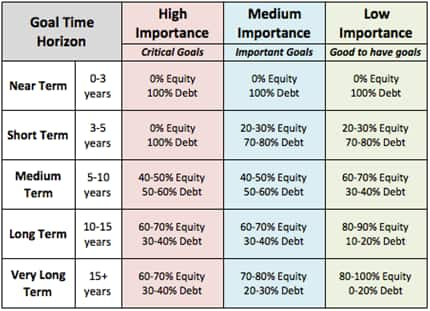



If you think carefully about what investing is, then you will realize that it’s not about beating the markets or your peers. It is simply about having a sufficient amount of money for your chosen financial goals. But most people don’t think like that. They try to get a tip here and there, invest in random products, and mirror someone else’s investment portfolio. As a result, they end up having a directionless portfolio of random investments that won’t take them anywhere. There will be occasional highs about picking the best fund or beating the market returns in a year. But ask about whether the investments are on course to achieving the intended goals, and people will have no clue.
This is where it’s necessary to intervene and bring back goals to the centre of investment discussions. And when it comes to goals, all targets are not alike. Different goals require different approaches.
The need for asset allocationFirst, understand that this is a general thought process towards deciding the asset allocation for your goals. There are no perfect formulae or equations to decide such things.
Once you are really clear about the financial goals you wish to pursue, you need to estimate the time horizons for each. For example:
-Near term goals (that are less than 3 years away)
-Short term goals (that are 3-5 years away)
-Medium term goals (that are 5-10 years away)
-Long term goals (that are 10-15 years away)
-Very long term goals (that are more than 15 years away)
Once you decide on the goals as per the time available, you then need to identify goal criticality. Why?
Because some goals will always be more important and critical than others. Right? Like saving for children’s education is much more important than taking a costly foreign vacation every year.
Let’s say you categorize your goals as follows:
-Critical / Must Have / Very Important
-Medium Importance
-Good to Have / Less Important

Now combine the time-horizon segregation with the goal-importance concept.
Organising goalsChildren’s education and retirement savings should come under goals of ‘high importance’. A goal like house purchase can come under ‘medium importance’. Replacing your iPhone every year would be of ‘low importance’.
There is another point to note. A goal might change in importance during the course of your life. So, for example, when you are unmarried, your major goal might be to purchase a house. But once you get married and already are paying for your house comfortably, then the goal of saving for children’s education will take higher priority.
Once you have goals on the grid, you can then decide the asset allocation to be filled in for different cells. Once again, this will depend on the type of investor you are. That is, whether you are an aggressive, a balanced or conservative investor.
But as an example, let’s say we are talking about a ‘Moderately Aggressive’ investor. Then, as a general sample, this is how the asset allocation might look for his goals.
This is just one of the many approaches one can take. But if you want to see a common thread, then it’s fairly evident. That you avoid (or have less) equities for short term targets and have more in equities for long-term goals.
That is about picking the target asset allocation for your financial goals when you begin. But as years pass, the time horizon for each goal will reduce. Right? And so a long-term goal will become a medium-term goal after few years. Similarly a medium-term goal will become a short-term goal after a few years. So the goal’s asset allocation too needs to be changed (via rebalancing) to reflect the change in available time horizon. This is the approach to de-risk your investments as you get closer to your goals.
All said and done, the summary is that different goals require different approaches depending on how critical they are, how much time is available and what kind of investor you are. Do not try to paint all the goals with the same brush and invest using random thumb rules. If you wish to manage your investments well, you need to craft individual asset allocation strategies for all the important goal-linked investments.
Discover the latest Business News, Sensex, and Nifty updates. Obtain Personal Finance insights, tax queries, and expert opinions on Moneycontrol or download the Moneycontrol App to stay updated!
Find the best of Al News in one place, specially curated for you every weekend.
Stay on top of the latest tech trends and biggest startup news.